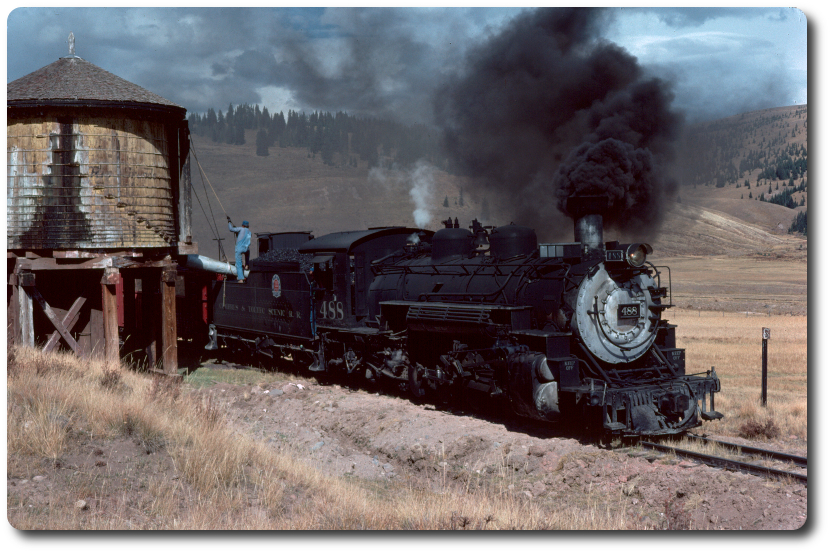I would like to draw your attention to the book
Rival Rails: The Race to Build America's Greatest Transcontinental Railroad by Walter R. Borneman. This was published by Randon House in 2010.
Quote
On pages 158-159 he writes:
Finally, it was the booming Leadville trade -- and Jay Gould – that brought the heads of both railroad to their economic senses. With considerable pressure from Gould, they sought a compromise. The legal morass of two years of court battles was resolved in a series of agreements between the Santa Fe and the Denver and Rio Grande and their various subsidiaries. Collectively, these came to be called the Treaty of Boston, because their terms were agreed upon in the boardrooms of the East and not the rocky canyons of the West. But significantly, their critical terms were first spelled out in a letter from Gould to the Santa Fe after he had conferred with Palmer's representatives, including Dr. Bell, "who happened to be in the City."
Essentially, the lease that had caused so much angst was declared null and void and all litigation terminated. The Santa Fe agreed not to build to Denver, Leadville, or the San Juan country, or any point west of the Rio Grande's lines for a period of ten years. In return, it was to receive half of the Rio Grande's business in and out of Leadville and southwestern Colorado and one-quarter of its Denver traffic. (In other words, ship east from Pueblo via the Santa Fe and not from Denver via the Kansas Pacific.)
The Rio Grande agreed not to build south of its existing railheads at El Moro, Colorado, or Espanola, New Mexico, on its San Luis Valley branch. Palmer's original goal of El Paso was extinguished, as was that of Santa Fe. And just to appease Jay Gould in his other ventures, the Rio Grande also promised that it would not build east to St. Louis. Meanwhile, Gould's stock in the Denver and Rio Grande went from $22 per share in the fall of 1879 to $75 in February 1880.
Finally, despite an appraisal by the court-appointed commission that the value of the Santa Fe's construction through the Royal Gorge was $566,216.35, based on A. A. Robinson's engineering records, the Denver and Rio Grande agreed to buy the 20 miles of line for $ I -4 million.
The components of the Treaty of Boston were signed as of March 27, 1880, and the first Denver and Rio Grande train ran through the Royal Gorge five days later. Its next major stop would be Leadville. Palmer's road celebrated its arrival in the booming silver capital on July 22, with a special carrying ex-president Ulysses S. Grant.
The ten-year no-build period actually applied to both railroads.
Borneman differentiates the Treaty of Boston from the Tripartite Agreement which also dates from 1880:
Quote
On page 200 he writes:
Finally, both the Frisco and the Santa Fe were watching the increasingly large shadow that Jay Gould cast over all railroad ventures. Concerned about their own independence or Gould's role in a competitor, the Frisco and the Santa Fe had additional reasons to be allies rather than foes.
The 1879 annual report of the Atchison, Topeka and Santa Fe told the results: "Another negotiation which required nearly six months to complete, secures your Company an interest in the valuable franchise of
the Atlantic and Pacific Railroad which gives your road right of way across Arizona and California to the Pacific Coast. Your Company, jointly with the St. Louis and San Francisco Railway Company, will
build a new road from Albuquerque along the thirty-fifth parallel, which in due time will form part of a transcontinentalline."
Formally ratified on January 31, 1880, this Tripartite Agreement was in some respects more sweeping than the Treaty of Boston or even the agreements between Huntington and Gould in Texas. Its triple nature came from the fact that the Santa Fe and the Frisco formed a jointly owned subsidiary further preserving the fiction of the old Atlantic and Pacific. Its stock, directors, costs of construction, and profits were to be equally divided between the Santa Fe and the Frisco. This reborn Atlantic and Pacific Western Division was to build west from the Santa Fe
line at Albuquerque, claiming as it went the original Atlantic and Pacific land grant.
Donald Duke and Stan Kistler in the book
Santa Fe … Steel Trails Through California, published by Golden West Books in 1963, also use the Tripartite Agreement for the agreement between the Santa Fe and the Frisco regarding the Atlantic Pacific.
Quote
On page 11 they write:
In 1879, negotiations were begun between the Santa Fe and the St. Louis & San Francisco regarding the rehabilitation of the Atlantic & Pacific Company and the completion under its charter to the Pacific Coast. By an accord known as the Tripartite Agreement. dated January 31, 1880, one-half of the capital stock of the Atlantic & Pacific Company then owned by the St. Louis & San Francisco Railway Company was transferred to the Atchison, Topeka & Santa Fe Railroad. Construction of the Western Division was promptly launched under the banner of the Atlantic & Pacific Railroad. The railhead was pushed across New Mexico, crossing the continental divide east of Gallup.
Walter Borneman is also the author of such books as
•
1812: The War That Forged a Nation
•
Polk: The Man Who Transformed the Presidency and America
•
The Admirals: Nimitz, Halsey, Leahy, and King: The Five-Star Admirals Who Won the War at Sea
and on Colorado subjects;
•
Marshall Pass: Denver & Rio Grande, gateway to the Gunnison country : featuring the Dow Helmers collection
and co-authored
•
14,000 Feet: A Celebration of Colorado's Highest Mountains
•
The Story Of A Valley: Georgetown Loop Historic Mining and Railroad Park
Brian Norden
Edited 3 time(s). Last edit at 01/24/2015 10:03PM by Brian Norden.





